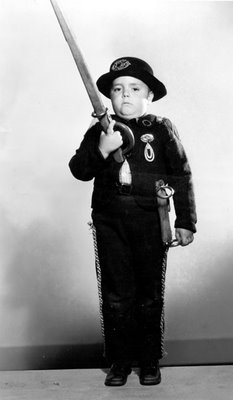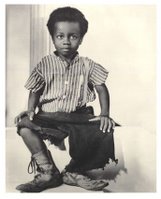
Was General Spanky as funny in 1936 as it is today? Time has twisted this picture from the wholesome boundaries of its intended domain to something that today’s social climate cannot tolerate. It runs counter to some very basic ideas we have about children, sex and race (and yet, it is not racy). No producer would touch General Spanky today because its very fiber is now offensive, and yet, ironically, its heart is so purely innocent and benign that it requires a sense of guilt in order to abhor it.
An orphaned drifter, Spanky (George McFarland), stows aboard a riverboat and meets with runaway slave Buckwheat (Billie Thomas). Buckwheat is in search of a master and adopts Spanky to fill that capacity. Initially Spanky rejects the offer, but is forced to accept it when Buckwheat, acting without consent, tries to help Spanky’s shoe shine business with an ill-conceived scam that involuntarily implicates Spanky. When Buckwheat's scam is discovered, a chase by grown-ups ensues and sends the pint sized pair headlong into the river (the film's funniest moment). Back on shore and in search of food, Spanky comes across an enlightened Confederate officer (whom he met at the very beginning of the movie. He will be referred to hereafter as ‘Gentleman Rebel’) who takes care of him. The Gentleman Rebel likes Spanky because of his moxy, but is not aware that Spanky has a hungry slave in tow since Buckwheat had remained just out of sight. Hilarity follows as Spanky and the Gentleman Rebel feast on a chicken dinner while a malnurished Buckwheat, still hidden, tries to partake in the meal without making his presence known. He is discovered, however, and far from becoming angry, the Gentleman Rebel assumes Buckwheat’s servitude.
 When it is time for the Gentleman Rebel to go off to war (yes, the war started somewhere around this point) he lets Spanky and Buckwheat remain at his house. Spanky is adamant about defending the homefront and marches with Buckwheat, patrolling the estate. They run into another army of kids being commanded by Alfalfa. With his own brand of bravado, Spanky envelops and absorbs Alfalfa’s contingent into his army. When the real Yankee army comes to town, the kids have already fortified the place. Mistaking the kids for an actually army, the Yankees lay siege to the rascals. The two forces exchange volleys until the incompetent Yankee colonel calls his general for reinforcements. Overestimating his enemy’s strength, the Yankee colonel toots his own horn when the general arrives and Spanky reluctantly sends up a white flag. The Yankee colonel’s folly is revealed to the general, however, when the scaled down rebels emerge from their fort. Needless to say, Spanky and the incompetent Yankee colonel are instant enemies.
When it is time for the Gentleman Rebel to go off to war (yes, the war started somewhere around this point) he lets Spanky and Buckwheat remain at his house. Spanky is adamant about defending the homefront and marches with Buckwheat, patrolling the estate. They run into another army of kids being commanded by Alfalfa. With his own brand of bravado, Spanky envelops and absorbs Alfalfa’s contingent into his army. When the real Yankee army comes to town, the kids have already fortified the place. Mistaking the kids for an actually army, the Yankees lay siege to the rascals. The two forces exchange volleys until the incompetent Yankee colonel calls his general for reinforcements. Overestimating his enemy’s strength, the Yankee colonel toots his own horn when the general arrives and Spanky reluctantly sends up a white flag. The Yankee colonel’s folly is revealed to the general, however, when the scaled down rebels emerge from their fort. Needless to say, Spanky and the incompetent Yankee colonel are instant enemies.The incompetent colonel is stationed to occupy the town. The plot thickens when he lays eyes on the Gentleman Rebel’s lady. The colonel makes a monkey of himself on several occasions. Meanwhile, the Gentleman Rebel is wounded in a nearby battle and wanders back to his Yank controlled home. Spanky takes care of his guardian and hides him in a secret hideout. When the colonel learns the Gentleman Rebel is nearby, he doggedly, albeit ineptly, tracks him down. After the incompetent colonel manages to arrest the Gentleman Rebel, he wants to execute him because the kids had the Gentleman Rebel dressed in civilian clothes. All looks hopeless until Spanky goes to the Yankee general and pleads his case. The Yankee general sides with Spanky and saves his friend from the firing squad.
General Spanky was ably directed by Fred Newmeyer who is better known for his work on Harold Lloyd gems like The Freshman, Girl Shy, and Safety Last. He was a pioneer of comedy direction and this film profits from such experienced hands. The period scenery is surprisingly detailed and well done, looking like a mix between the Old South and the Depression. General Spanky also walked away with an Academy Award for best sound. Add to that the talent of the kids and you have the components for a solid comedy. However, that is not why it is funny.
 General Spanky is funny because, whether it was intended to or not, it upholds these comedy truths: it challenges accepted social behavior; it confronts the rational world with irrationality; and it is surprising in its ignorant audacity. This movie will cause you to squirm more that you will laugh, but it is that very characteristic that makes it resonate long after the viewing. Moments that seemed trifling grow in the digestion. Buckwheat as a willing slave is an uncomfortable image. This movie is an archival crystal ball that gives a sense of how segregation affected racial comedy. It is to Buckwheat’s merit that he still can come across funny instead of tragically sad. When the gang engages the Union army and are fired upon, the intensity almost approaches a Private Ryan level, where real bullets are whizzing all around and General Spanky is acting like Stonewall Jackson. At one point it appeared like the next likely scene will be Alfalfa’s amputation, but alas, it did not go that far. The violence is offset by the villain’s ineptness.
General Spanky is funny because, whether it was intended to or not, it upholds these comedy truths: it challenges accepted social behavior; it confronts the rational world with irrationality; and it is surprising in its ignorant audacity. This movie will cause you to squirm more that you will laugh, but it is that very characteristic that makes it resonate long after the viewing. Moments that seemed trifling grow in the digestion. Buckwheat as a willing slave is an uncomfortable image. This movie is an archival crystal ball that gives a sense of how segregation affected racial comedy. It is to Buckwheat’s merit that he still can come across funny instead of tragically sad. When the gang engages the Union army and are fired upon, the intensity almost approaches a Private Ryan level, where real bullets are whizzing all around and General Spanky is acting like Stonewall Jackson. At one point it appeared like the next likely scene will be Alfalfa’s amputation, but alas, it did not go that far. The violence is offset by the villain’s ineptness.If uniqueness is a claim to genius, then this odd little piece coming from the film factory has an argument.








.jpg)






No comments:
Post a Comment